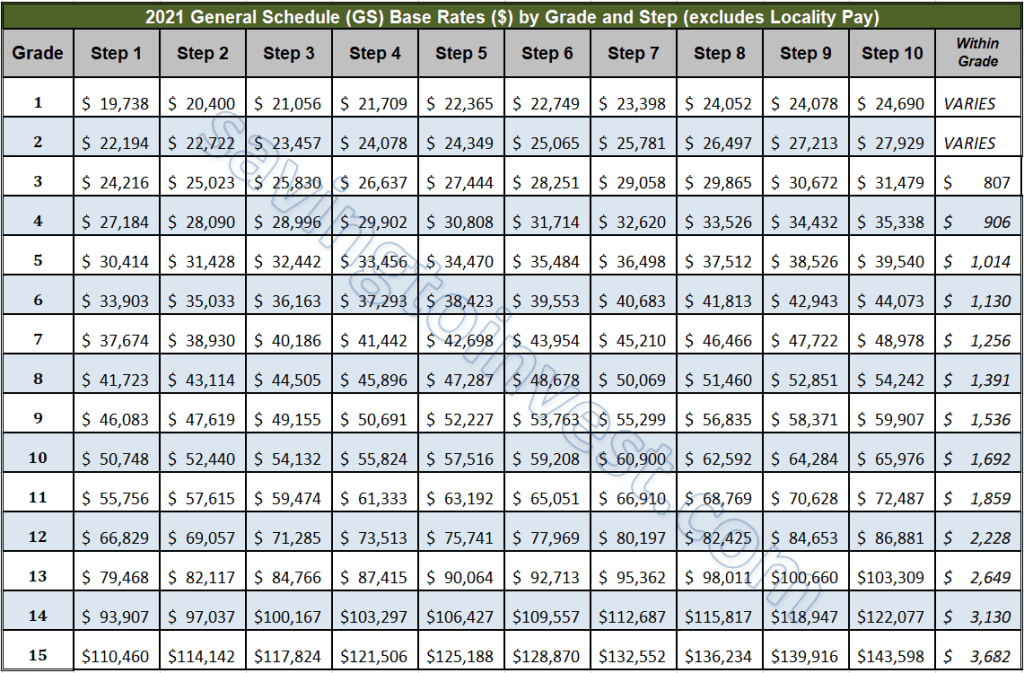Understanding the Federal Employee GS Pay Scale
Navigating the complexities of federal employment often begins with understanding the General Schedule (GS) pay system. This structured framework dictates the salaries of the vast majority of federal government civilian employees. What does this mean for prospective and current federal workers? Let's delve into the intricacies of the GS pay grades, explore how they're determined, and understand their implications for your career.
The GS pay schedule isn't just a list of numbers; it's a roadmap for your potential earnings within the federal government. From entry-level positions to senior executive roles, the GS system classifies jobs based on factors like skill, education, and experience. Each job is assigned a GS grade, ranging from GS-1 to GS-15, with higher grades signifying greater complexity and responsibility. This standardized approach aims to ensure fair and equitable compensation across the federal workforce.
Understanding how your salary is calculated under the GS system is crucial for managing your finances and planning your career progression. The GS pay schedule establishes a base salary for each grade level. This base salary is then adjusted based on locality. Since the cost of living varies significantly across the United States, locality pay adjustments ensure that federal employees' salaries reflect the economic realities of their geographic area. These adjustments can significantly impact your take-home pay.
The history of the GS pay schedule dates back to the Classification Act of 1923, which established a standardized system for classifying and compensating federal employees. This act aimed to replace a patchwork of inconsistent pay practices with a more structured and equitable approach. Over the years, the GS system has undergone various revisions and adjustments to keep pace with evolving economic conditions and workforce needs. Its importance lies in its role in ensuring fair compensation, attracting and retaining qualified talent, and promoting transparency within the federal government.
One of the primary issues surrounding the GS pay system is the perceived disparity between federal salaries and those in the private sector. While the GS system offers stability and benefits, private sector salaries for comparable roles may, in some cases, be higher. This can lead to challenges in attracting and retaining top talent in highly competitive fields. Another issue involves the complexity of the system itself. Understanding locality pay adjustments, within-grade increases, and other nuances of the GS pay scale can be challenging for employees.
The GS pay schedule consists of 15 grades, from GS-1 to GS-15. Each grade has 10 steps, representing incremental salary increases within that grade. For example, an employee might start at GS-7, Step 1, and progress to GS-7, Step 10 over time based on satisfactory performance. Promotion to a higher grade, say GS-9, would involve a jump in salary to the corresponding GS-9 step based on their qualifications.
Benefits of the GS Pay Schedule:
1. Transparency: The publicly available GS pay tables make it easy to understand potential earnings.
2. Structure: The clearly defined grades and steps provide a predictable career progression path.
3. Equity: The system aims to ensure fair compensation based on job responsibilities and experience.
Advantages and Disadvantages of the GS Pay System
Advantages and Disadvantages
| Advantages | Disadvantages |
|---|---|
| Transparency and predictability | Potential salary gap with private sector |
| Structured career progression | Complexity of locality pay adjustments |
| Job security and benefits | Limited negotiation power for individual salaries |
Frequently Asked Questions:
1. How is my locality pay determined? Locality pay is based on the Metropolitan Statistical Area (MSA) where you work.
2. How do I advance within a GS grade? Typically, within-grade increases are based on performance and time in grade.
3. How do I get promoted to a higher GS grade? Promotions are based on meeting the qualifications for higher-graded positions and competing for open vacancies.
4. Where can I find the current GS pay tables? The Office of Personnel Management (OPM) website provides the latest GS pay schedules.
5. What are special pay rates? Certain federal positions may qualify for special pay rates due to unique job requirements or working conditions.
6. How does the GS system handle pay for overtime work? Overtime pay for federal employees is calculated based on specific regulations.
7. How are within-grade increases determined? Within-grade increases are typically awarded based on acceptable performance and time in grade.
8. How does locality pay affect my overall salary? Locality pay is added to your base GS salary to determine your total compensation.
Tips and Tricks: Research different agencies and locations to understand how locality pay affects potential salaries. Utilize the OPM website's resources to fully grasp the GS pay system and plan your career strategically.
In conclusion, understanding the intricacies of the GS pay grade schedule for federal employees is essential for anyone considering or currently pursuing a career in the federal government. This structured system, while complex, offers a clear path for career progression and ensures fair compensation based on job responsibilities and experience. While challenges such as potential pay gaps with the private sector exist, the GS system offers stability, comprehensive benefits, and a transparent framework for salary determination. By taking the time to research and understand the GS pay system, federal employees can effectively manage their finances, plan their career trajectory, and maximize their earning potential within the government. Exploring resources like the OPM website and seeking guidance from human resources professionals can further empower you to navigate the GS system and make informed decisions about your federal career.
Tee off to your dream home pga village port st lucie real estate
The four heroes unveiling episode 1s french subtitled release
Tiktok logo aesthetic the power of pastel blue






